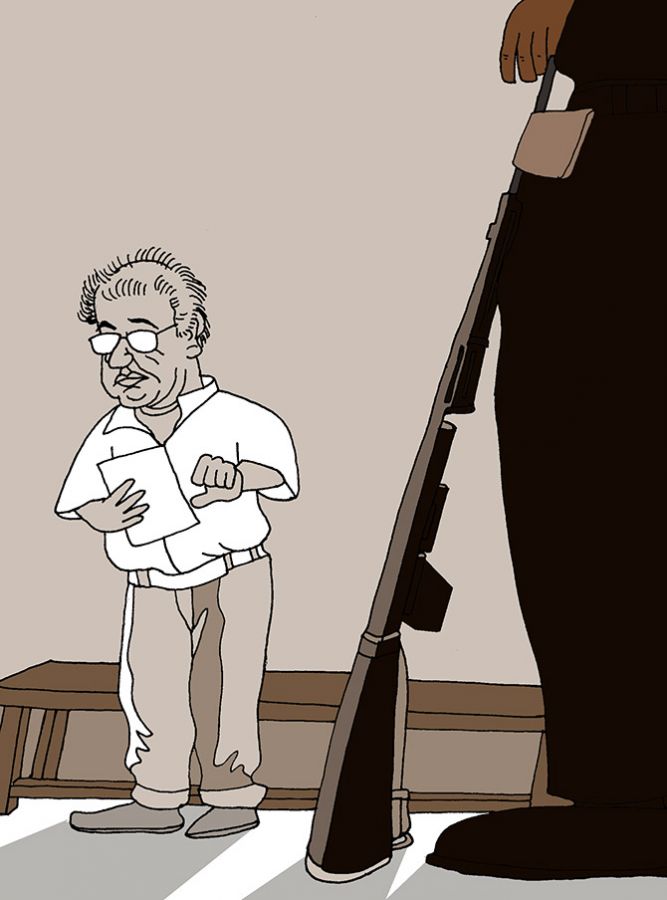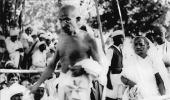'At the back of the courtroom the three accused sat trying to catch the drift and fathom the new, inexplicable turn the case could be taking.'
'And the consequences it might have on their lives.'
Vaihayasi Pande Daniel continues her riveting reportage from Courtroom 51.
Illustration: Uttam Ghosh/Rediff.com

Winter has ceded to spring. Spring has turned to summer.
And today, June 12, the monsoon clouds were gusting in from the southwest and scudding across the Mumbai skies.
The relief, as the temperatures inch downwards, was welcome for undertrials, their relatives and lawyers, roasting for the last two months, in the corridors of the city's sessions court at Kala Ghoda, where it effectively reached nearly 40 degrees, on earlier days, if you count humidity.
It was confounding to note that, even three changes of season later, the Sheena Bora murder trial, unlike the mercury, has progressed not even a degree.
The latest development was the assignation of a brand new CBI court judge.
Judge H S Mahajan, who had been on the Sheena Bora case for close onto two years, moved out to a sessions court in Aurangabad, Maharashtra.
On his final day on this case, May 22, he had hoped to move the trial along a tad and at least conclude the testimony of the very first witness, Khar police Constable Ganesh Dalvi.
That was not to be.
Since February the trial, shortly after it began, was languishing, as it anticipated a view from the Bombay high court.
An opinion had been sought from there on the admissibility of Dalvi's testimony which touched on what the Mukerjeas' driver, Shyamvar Rai, first an accused now an approver, said to him.
After 71 days, the high court had ruled. But it took another 40 days, yes 40 -- because of various holidays in May -- for the judgment to be typed up and sent across.
When the motley trio of accused arrived, from their respective jails, before Judge Mahajan, on May 22, he said there was nothing he could do that day since he didn't have the written judgment still.
Instead, in an avuncular, kindly fashion, he summoned Indrani Mukerjea, her husband Peter Mukerjea and her ex Sanjeev Khanna into the tiny witness box in front of the court.
He wished them well and asked them to take proper care of their health.
The judge also suggested Indrani, Peter and Sanjeev work well with the new judge, move the trial along quickly and finish it.
He said he could have finished it in a few months had he stayed on.
I studied the faces of the accused. None of them registered a sense of puzzlement. Or incredulity.
Peter's face is usually the most mobile, when it comes to conveying dismay. Or irritation.
No. Their expressions were all rather blank. Perhaps having been cogs in our legal behemoth for three Indian summers, just about nothing was beyond belief.
If they didn't, I certainly mulled over what the judge said. How would the accused be able to bring briskness to the legal machinery? A conundrum.
Peter started to mumble something to the judge on another matter and changed his mind. Judge Mahajan asked him to speak up.
The former television mogul (now even more so in the news with alleged connections between the financing of the Mukerjeas' INX media and former finance minister P Chidambaram's son Karti apparently discovered, and their former home being searched again) said he was having back issues and wanted to change his mattress at Arthur Road Jail.
The judge asked him to send an application to get that done.
The courtroom then emptied out and the trio took their usual stations in the hallway outside with their lawyers and family.
Elfin Indrani -- she was dressed that day a trifle police lady-ish, in a dark blue and khaki kurta-salwar ensemble, but yet looked like a little girl -- involved herself with her legal papers.
Sanjeev happily received a couple of novels from his cousin Nikhil Kapur.
And Peter had some plump laddus from his sister Shangon Das Gupta, which he offered his police escort, but they promptly, aloofly, refused.
Then they all were packed off jail-wards, not before the media quizzed them about Karti Chidambaram, who Indrani said she knew, but not much more.
And so the Mahajan chapter of this infamous murder case drew to a close.
The word anti-climax has slowly gained a new meaning for me ever since I started covering this trial.
An anti-climax assumes there are ups and downs in a narrative. But court coverage, I am learning fast, rarely has a climax -- it's like the all too straight lines that can come out of an EEG or ECG machine.
Its narrative is a series of anti-climaxes or non-events brought about by delays, postponements and court dates, back to back, where no business is conducted.
When I arrived in court today, I sifted through the various reasons why nothing might happen, as usual, on the case.
Since the judge was new, maybe he might ask for further time to examine the details of the case.
Or maybe the judge had not yet been assigned.
Or maybe the typed up judgment from the high court had still not been received.
Judge Mahajan's successor, the tall Judge J C Jagdale, with a droopy moustache, dressed in all white, under his robes, took the chair in Courtroom 51 after 11 am.
A less phlegmatic man, he quickly got to work understanding the twists and turns of the case and seemed, to my inexperienced eyes, possibly like a new breath of fresh air in the courtroom which now has a television screen that may not be operational yet.
But wherever a delay can be wiggled in, into the system, it slowly but surely gets jimmied in: The CBI today was represented by counsel Kavita Patil, in a black, white and gold sari, a refreshing contrast to those ill-fitting black suits lady lawyers habitually wear.
She took off, in a ponderous fashion, in Marathi, about how the CBI was now contemplating going to the Supreme Court to counter the high court's opinion.
She felt there was room for reinterpretation because when driver Rai made his testimony to Constable Dalvi it was not yet an investigation into the Sheena Bora murder, but an arms case -- Rai was carrying an unlicensed weapon.
Patil said the CBI needed time to think about whether it should approach the highest court. She said something to the effect: "We (the prosecution) are yet to get the certified copy of the order from the high court and we will (then) decide whether to move the apex court."
At the back of the courtroom the three accused sat trying to catch the drift -- conversation between lawyers and the judge does not reach the back of the room to the accused -- and fathom the new, inexplicable turn the case could be taking.
And the consequences it might have on their lives.
If the CBI did get to go to the Supreme Court, months and months of delay could be at hand for the accused.
It would be several seasons more of waiting, in tandem with pointless trips to the sessions court, while the trial is on pause, in lives already on indefinite Pause.
Peter, looking tired -- doing, as per his own assessment, "not too badly" given the "circumstances" -- was in Courtroom 51 with his sister Shangon and her California-based son Shujah and Peter's friend.
Sanjeev and his cousin Nikhil were sitting side by side, on the last bench, again discussing and exchanging novels, none of which appeared to be The Ministry of Utmost Happiness.
Prior to that, Sanjeev, who seems to have the uncanny chameleon knack of being able to belong anywhere, had sat outside chatting in a lively manner, like he was with old friends, with the cops, the conversation going into long yarns and bouts of laughter.
Who would believe he was there as an accused in a murder trial?
Indrani, clad top to bottom in white, her salwar cuffs rolled up to prevent it getting scuffed from the puddles, made a breathlessly late appearance, as Judge Jagdale was unraveling why Patil felt the urge to head to the Supreme Court.
In an exchange, where it seemed the judge was gently hoping to change Patil's mind, he raised several examples of how investigations always start off without a clear intent or end in sight and goes through all manners of chops and changes.
Patil nevertheless firmly requested time. Judge Jagdale pinned her down to 10 days.
The CBI has to be back in court on June 22 with their road map in place.
After topping up on a box of perhaps the last of the season's Alphonso mangoes, a thermos of tea, sandwiches, Peter, who still has an almost jaunty, courtly air about him, in spite of his woes, headed off, after Sanjeev, to the prison bus, his bag containing a few home goodies, that had been vetted by the cops, one of them carrying an SLR rifle (which apparently went out of service elsewhere in the world in 1998).
Indrani stayed on, signing cheques, as she waited for her main counsel.
When she arrived they went back into the courtroom to approach the bench.
Money was the issue this time.
Since February Indrani had not been able to sign cheques because the jail authorities kept changing the requirements needed for her to do that, in spite of earlier court orders empowering her to do so.
The jail required details of the bank accounts to whom the cheques were going, then a notary present and the latest necessity was past bank statements of the cheque bearers.
As a result, her daughter 19-year-old Vidhie (from Indrani's marriage with Sanjeev, but whom Peter had adopted), the lawyer said "who is all alone" and has no family to look after her, and the lawyers, had not been receiving their cheques nor the income tax had.
Judge Jagdale passed a fresh order.
After about 40 more minutes of paperwork outside, with impatient lady cops looking on, one of them holding another vintage SLR rifle, Indrani departed for the Byculla jail.
Under her arm was a copy of the May 2017 Savvy magazine, which has an interview with Vidhie.
Her face is on the cover under the grabbing headline: 'All we heard was my dad screech murder... It was a shocker!'
EARLIER IN THE TRIAL...











 © 2025 Rediff.com -
© 2025 Rediff.com -